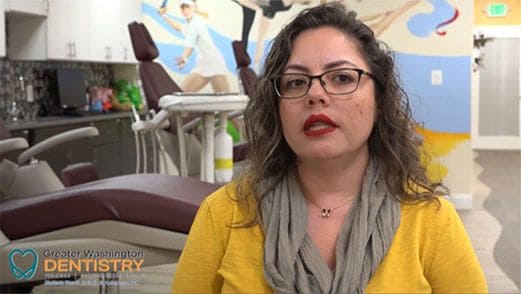
Advice for Infant Tongue-tie
Break-through technique that can facilitate breast-feeding
By John Byrd – ELAN Magazine

Dr. Sharif, who has been practicing for
23 years, is a diplomate of the American
Board of Pediatric Dentistry and an associate professor at Howard University.
“When an infant has noticeable challenges with breast-feeding, it is essential to have the problem properly diagnosed,” says Dr. Shohreh Sharif, who founded Greater Washington Dentistry almost 25 years ago and is one of the area’s leading practitioners of pediatric dentistry. “When certain symptoms are present, the cause of the difficulty may be tongue-tie, which, in one form or another, effects about ten percent of the population.”
Tongue-tie, or ankyloglossia, is a condition in which the frenulum (the thin flap of skin under the tongue that attaches to the bottom of the mouth) is short and limits tongue motion, especially the ability to lift and extend. The frenulum may be attached near the tip of the tongue and on the back of the lower gum. Ankyloglossia is rarely a serious medical problem, but can cause real difficulties with breastfeeding.
When a baby breastfeeds normally, the tongue is extended and curled into a U-shape on the underside of his mother’s breast. The nipple and surrounding breast tissue are drawn deeply into the baby’s mouth, near the back of the throat, so that when the baby suckles, the nipple is not pinched against the roof of the mouth. With tongue-tied babies, however, limited tongue motion may prevent the baby from taking the breast deep in the mouth and even interfere with latching.
Some signs to look for:
- A “heart-shaped” tongue, with a dent or divet in the tip of the tongue, especially when crying.
- Inability of the baby to latch onto the breast; mouth settles on the nipple, but pulls off repeatedly.
- Infant “latches on” but tends to “slide off” the breast during the feeding; baby is only weakly attached to the breast.
- Baby makes clicking sounds or sucking-in of the cheeks while nursing.
- Mother experiences nipple pain throughout the feeding which doesn’t improve with re-latching; nipple may appear pinched like a tube of lipstick; bruising, scabbing, cracking of nipples.
- Baby exhibits excessive weight loss or failure to gain weight despite nursing adequately.
- Mastitis (breast infection) and/or low milk supply, usually due to infrequent or incomplete emptying of the breast

Opposite: Each mother-baby coupling is different. If there’s a difficulty with breastfeeding, an experienced lactation consultant may be needed evaluate the situation, determine the root of the problem and assess what actions should be taken.
Above: “Treatment for tongue-tie (ankyloglossia) can be simple,” says Dr Shairf. “We usually perform the procedure in our office using laser technology– which doesn’t cause bleeding and doesn’t call for sutures.
None of these symptoms means conclusively that a baby is tongue-tied, nor does every tongue-tied baby have difficulty breastfeeding. Pre-term or “sleepy” babies also may have challenges latching at the breast.
Also, nipple pain can occur in mothers who have infants without tongue-tie, and will usually improve with attempts to adjust the latch.
Each mother-baby coupling is different. Some babies who appear to have a significant tongue-tie are able to breastfeed well. Others with an apparently mild degree of tongue-tie may struggle. This is why it is critical for an experienced lactation consultant to evaluate each situation, determine the root of the problem and assess what actions should be taken.
“The good news is that treatment of ankyloglossia in the newborn can be simple,” says Dr Sharif. “In fact, we usually perform the procedure in our office using laser technology that doesn’t cause bleeding and doesn’t call for sutures.”
In the procedure practiced at Greater Washington Dentistry, the baby is swaddled while the tongue is gently lifted using a special instrument such as a tongue retractor. The frenulum is then quickly corrected using a special laser. next, the tongue is lifted to confirm that it can now roll and move about freely.
The entire procedure takes about 15 minutes and often does not require anesthesia. Since the frenulum is very thin and has few nerves, there is little pain. The baby can breastfeed; mothers often notice improvement soon after the procedure is completed.
If the frenulum is left untreated, breastfeeding may improve on its own with time and practice. but, for others, nipple pain may become so severe that mom quits nursing entirely.
As a result, some babies will fail to gain adequate weight since they don’t express mother’s milk effectively from the breast. Some mothers, in fact, develop mastitis and/or low milk supply as a result of the breast not being effectively emptied at each feeding.
Tongue-tie is not the cause of all breastfeeding problems, and frenotomy is not a cure all. But for those infants having breastfeeding trouble, it should be considered as a possible cause and appropriately treated.
Careful evaluation of the infant and mother can overcome many breastfeeding obstacles.


